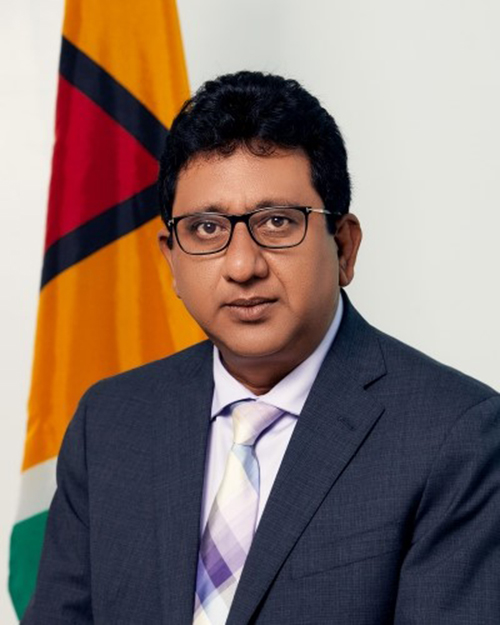It is the contention of Attorney General (AG) Anil Nandlall SC that the Full Court of the High Court has no jurisdiction to hear any matter arising out of anything connected with an election petition.
This was the AG’s argument yesterday morning before the Guyana Court of Appeal, where the main opposition APNU+AFC has lodged an appeal against the dismissal of one of its two petitions challenging the March 2nd, 2020 General Elections.
The AG’s position is that the Court of Appeal itself has no jurisdiction to hear the appeal currently before it, since it did not stem from the hearing of by the High Court, of the substantive petition.
During the course of previous arguments, the Court of Appeal engaged an enquiry as to whether the appellant may be able to approach the Full Court of the High Court to challenge the dismissal of its petition on the preliminary issue of late service.
It is in response to this issue that Nandlall said the Full Court has “absolutely” no such jurisdiction.
He reiterated previously-stated arguments that the High Court alone—in its special jurisdiction— has power to adjudicate over an election petition, and that an appeal would then lie of right to the Court of Appeal, but only where the substantive petition has itself been disposed of.
He said that in the instant case, since the substantive petition was not heard, there is no right of appeal to the Court of Appeal and more so—none to the Full Court—which has never been given any such jurisdiction to preside over election petitions.
He told the Bench comprising acting Chancellor Yonette Cummings-Edwards and Justices of Appeal Dawn Gregory and Rishi Persaud, that Section 79 of the High Court Act “shuts the door” on any further hearing regarding a petition which has not been heard on its substantive base.
He said that an appeal in those circumstances is not “of right,” but is “created by statute…and you cannot create a jurisdiction where one does not exist,” he told Chancellor Cummings-Edwards in response to a question she had posed to him.
Justice Gregory noted that in rendering her decision, this is an issue she will be examining closely. She said it must be interrogated whether the appellant in the circumstances “will be shut out from Court;” or whether there is another constituted Court which can hear such an appeal.
Lawyers in the matter have been given timelines to file and serve submissions on the issue surrounding any involvement which the Full Court may have.
The matter is returnable for November 26th for reports; and Chancellor Cummings-Edwards has indicated that the Court is likely to thereafter set a date for ruling or reserve its ruling for a date to be announced.
In January, acting Chief Justice (CJ) Roxane George SC, threw out the petition after finding that APNU+AFC presidential candidate David Granger was not served on time.
The petitioners subsequently appealed the ruling, arguing, among other things, that the Chief Justice erred in law and misdirected herself by misapplying the doctrine of strict compliance and holding that such compliance related to the contents of the affidavit of service instead of the filing of the affidavit of service in a timely manner.
It has been the position of Nandlall for the State, and Trinidadian Senior Counsel Douglas Mendes who represents now President Irfaan Ali and Vice President Bharrat Jagdeo—who are among the number of respondents listed in the action, that the Court of Appeal has no jurisdiction to hear the matter.
Trinidadian Senior Counsel John Jeremie who leads a battery of attorneys for petitioners—Monica Thomas and Brennan Nurse—in whose names the coalition’s petition was filed has, however, argued their position that the Court of Appeal does have jurisdiction to hear the matter.
He has previously submitted that his clients had properly invoked the jurisdiction of the superior court to where an automatic right of appeal lay as the High Court had determined and made its pronouncement on the petition filed by his clients.
Nandlall’s and Mendes’ contention has been, however, that because the High Court had not determined any of the questions provided for in Article 163 (1) of the Constitution, which would have allowed for the petition’s substantive hearing, there is no appeal that can be mounted before the appellate court.
Jeremie has argued that with the Chief Justice having disposed of the matter, the Court of Appeal now has the jurisdiction to hear an appeal.
Mendes has also argued that striking out the petition for late service is not something that can be appealed, while stressing that an appeal can only be possible after satisfying the prerequisite steps of determining any of the questions in Article 163 (1), by which an election petition can then be said to have been substantively heard.
The petitioners’ contention is that the elections were unlawfully conducted and/or that the results (if lawfully conducted) were affected or might have been affected by unlawful acts or omissions. They nonetheless argue that from those polls it is Granger who should be declared the duly-elected President of Guyana.
They were seeking to have the court nullify the outcome and to declare President Irfaan Ali to be illegally holding office.
The results of a national recount of all ballots cast showed that it was the PPP/C which had won the general elections with 233,336 votes over the coalition’s 217,920 votes.
The second of the petitions filed by the Opposition which they have since also lost, is also before the appellate court. It has not yet been called.






